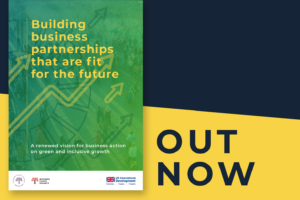In keeping to tradition, the SEEP Network’s Annual Conference will undoubtedly be challenging development practitioners on how to significantly leverage the impact of development investments and initiatives. The gathering has for a long time been used as a key industry platform to acknowledge and address the most current challenge areas, and cutting edge practices that are addressing these. The line up of plenaries and workshops in the area of enterprise and market development suggest an urgent need to consider how development initiatives can engage more closely and intentionally with the private sector in delivering development solutions to those people and communities that need them most. Recognizing that markets operate as inter connected systems appears to be an underlying theme, whether approaches range from strengthening input supply systems, output buyer approaches, or support businesses and functions. A further focus appears to be exploring appropriate assessment practices through drawing learning from complexity and systems approaches to capture value creation in regional and global market systems – extremely cutting edge and no doubt key in leading market and enterprise development practice the in forthcoming years.
Although cross-cutting in nature, key sectors to be highlighted appear to be agriculture and food security related, with traditional public sector areas such as health receiving interesting coverage.
Plenary debates will include Business Fights Poverty, Practical Action and local private sector representatives from developing countries exploring critical components to private – public partnership success at global and local level. Through workshops, models where the private sector and development practitioners have successfully engaged, drawing on challenges and lessons learned to provide guidance to future practice, will be explored, highlighting experience from organizations such as SwissContact in Bangladesh and Rwanda. Successes in providing innovative ag-technologies and technical assistance to rural areas and thousands of small scale producers through cost effective, flexible business models scalable through the private sector, will be discussed, drawing on experience from those such as Practical Action and CARE in regions including Peru and Bangladesh.
Innovations in linking poor rural households to markets in developing economies through working with local firms and strengthening producer organizations will be highlighted, drawing on experiences from organizations such as ACDI/VOCA. Tools tested by ACCENTURE to build development staff capacity to effectively facilitate market development will be presented, recognizing critical learning throughout their development process by CARE, and piloting by Practical Action, Conservation International and CHF.
Innovative efforts to strengthen access to effective health services and products to poor families through collaboration between health, financial service, and market development firms will be explored as critical efforts in finding solutions to increasing global heath challenges, drawing on learning from leading development organizations such as Freedom from Hunger, MEDA and Banyan Global.
The question, as always, remains as to whether the global development community will heed to the challenges being evoked to ultimately improve development strategies to achieve increased economic growth for poverty reduction globally with increased impact and scale.










